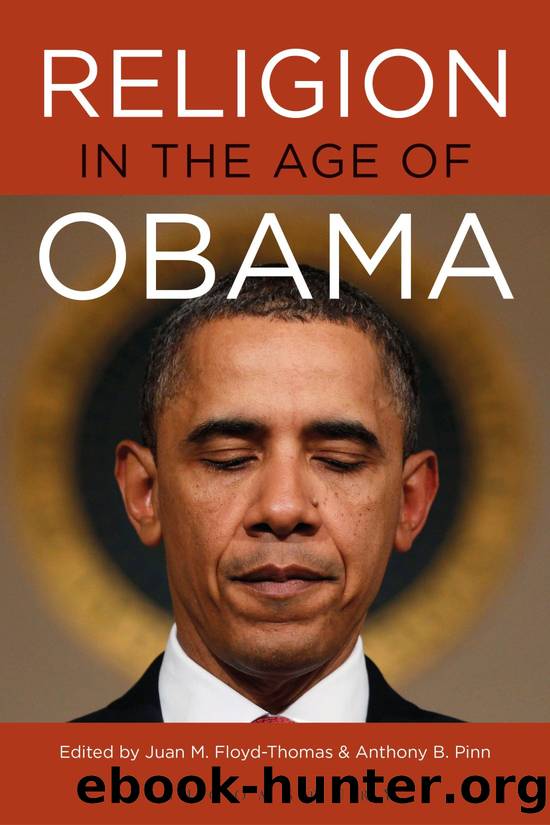Religion in the Age of Obama by Juan M. Floyd-Thomas Anthony B. Pinn

Author:Juan M. Floyd-Thomas,Anthony B. Pinn
Language: eng
Format: epub
ISBN: 9781350041066
Publisher: Bloomsbury UK
Part Three
On Race/ing Belief
9
When White Is the “New Black”: Religious Populism in the Age of Obama
Keri Day
Throughout the history of America, nonwhite populations such as African Americans have been “racialized,” seen as possessing a “race,” while white populations have simply been interpreted as the default, a non-racialized group that articulates the norm and standard against which all other nonwhite US citizens are judged. However, whiteness is increasingly “racialized,” articulated as a racial or ethnic “other” under assault. Whiteness is understood as incurring political liability, rendering the history of white hegemony mute. Under the Obama presidency, white populism has intensified, coming to full expression with the 2016 election of Donald Trump. This chapter broadly explores how Christian religious fundamentalisms have fueled white populism in the United States, reshaping questions on race, racial injustice, and economic inequity under the Obama presidency. White religious logics and practices contribute to how white identity is now fretted over and pointed out so that the “new civil rights movement” is about focusing on how to combat practices of “white disenfranchisement.” In American politics today, white suffering is re-casted as the “new black,” the new oppressed subject within sociopolitical and economic spaces. This chapter offers a brief historical overview of whiteness, redefines what white populism is, investigates the social and political costs incurred by a white populist imagination, and concludes by asking how black religious leaders and thinkers might challenge a white populist agenda.
A brief historical view: The problem of whiteness
W. E. B. Du Bois notes that “the discovery of a personal whiteness among the world’s people is a very modern thing—a nineteenth and twentieth century matter, indeed.”1 Du Bois offers a very important observation about the idea of race in the United States: that it is a modern creation. Within Western society, the racial categories of white and black are often treated as biological facts. Throughout American history, whiteness and blackness have been seen as two separate “races,” which have been articulated as having an ontological status. In fact, it was assumed that the genetic differences between white and black populations were physiological facts beyond disputation. In 1920, Du Bois challenged this American assumption about race by speaking of whiteness in the language of “discovery,” connecting it to the modern epoch that was characterized by the colonization and conquest of non-European lands along with the enforced enslavement of Africans in the Americas.
What Du Bois attempts to reclaim is race as a contested concept—that racial categories are socially constructed and culturally produced, grounded in historical narratives of Western colonization and conquest. There have been a number of black scholars in the humanities and social sciences that have attempted to challenge the interpretation of racial categories as rooted in biology through mapping the emergence of whiteness, white supremacy, and white privilege. To speak of race is often to speak about how it has adversely affected and impacted those who are marginalized and oppressed, such as black people in the United States. But merely talking about black pain and injury misses what has created blackness in the first place: whiteness.
Download
This site does not store any files on its server. We only index and link to content provided by other sites. Please contact the content providers to delete copyright contents if any and email us, we'll remove relevant links or contents immediately.
| Africa | Americas |
| Arctic & Antarctica | Asia |
| Australia & Oceania | Europe |
| Middle East | Russia |
| United States | World |
| Ancient Civilizations | Military |
| Historical Study & Educational Resources |
Cat's cradle by Kurt Vonnegut(13857)
Pimp by Iceberg Slim(12924)
Underground: A Human History of the Worlds Beneath Our Feet by Will Hunt(11252)
4 3 2 1: A Novel by Paul Auster(11035)
The Radium Girls by Kate Moore(10903)
American History Stories, Volume III (Yesterday's Classics) by Pratt Mara L(4822)
Perfect Rhythm by Jae(4617)
Wiseguy by Nicholas Pileggi(4583)
The Fire Next Time by James Baldwin(4338)
Paper Towns by Green John(4165)
A Higher Loyalty: Truth, Lies, and Leadership by James Comey(4027)
Pale Blue Dot by Carl Sagan(3997)
The Mayflower and the Pilgrims' New World by Nathaniel Philbrick(3907)
The Doomsday Machine by Daniel Ellsberg(3726)
Too Much and Not the Mood by Durga Chew-Bose(3690)
Killers of the Flower Moon: The Osage Murders and the Birth of the FBI by David Grann(3606)
The Borden Murders by Sarah Miller(3582)
The Sympathizer by Viet Thanh Nguyen(3468)
Killing England by Bill O'Reilly(3450)
